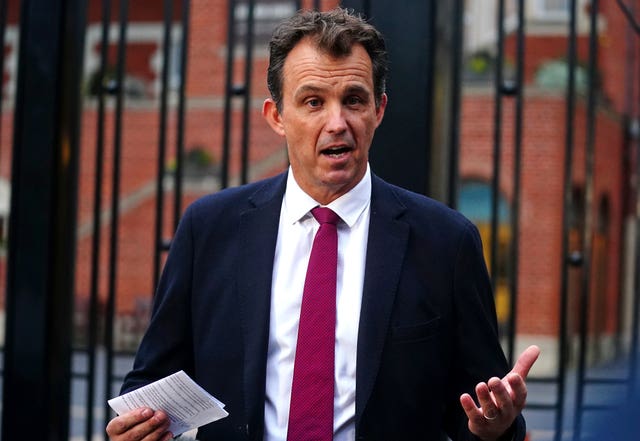
Yorkshire should not host international matches at Headingley until issues surrounding the influence of the Colin Graves Trust are resolved, the chair of a key parliamentary committee has said.
Former county chair Roger Hutton told the Digital, Culture, Media and Sport (DCMS) select committee last November that he wanted to remove chief executive Mark Arthur and director of cricket Martyn Moxon over their response to a report into allegations of racism raised by former player Azeem Rafiq.
However, Hutton said he was not given consent to do so by the Trust, which is owed a significant amount of money by the club and is linked to the family of former Yorkshire chair Colin Graves.
The committee, which also heard harrowing testimony from Rafiq himself, published its report on cricket’s racism crisis on Friday, urging the England and Wales Cricket Board to “clean up its act” on tackling discrimination or have limits placed on the public funding it receives.

The ECB removed Yorkshire’s right to host lucrative international games at Headingley over the former leadership’s handling of the Rafiq crisis, and DCMS committee chair Julian Knight said despite the impressive work done at Yorkshire by new chair Lord Patel, the role of the Trust had to be properly addressed before those matches could be restored.
“It gives me real pause for thought as to whether or not they’re ready (to host internationals) yet,” Knight told the PA news agency.
“Lord Patel has made great strides but we need to be sure that there is no repetition of a situation where those who need to be removed from senior positions at the club are not removed because of a road block through a Trust.
“I would question whether Yorkshire should get the matches back until that issue is resolved. I think that’s something we are going to explore with them and the ECB when they come in front of us in the coming weeks.
“I would question very closely the position of the Graves Trust within Yorkshire, or whether or not it should continue to have the influence and power that it does.”
Lord Patel told the BBC on Wednesday that it would be a “huge financial crisis” for the county if international matches were not restored this summer. Rafiq told the Daily Mail he felt the county had done enough to warrant being given the matches back.
Patel said in response to the report: “We welcome the select committee’s call for demonstrable action to rid our sport of racism and discrimination. Azeem Rafiq’s testimony was a watershed moment for the sport as a whole, and we are committed to ensuring that no-one endures the unacceptable experience that he did at Yorkshire County Cricket Club.
“In the last two months Yorkshire County Cricket Club has made significant progress in our efforts to rebuild, and I am heartened that the committee considers that there is room for optimism in what we have achieved. We share that optimism and have made some real improvements, but we are only at the start of this long and important journey.”
The report found Rafiq a very convincing witness, but Knight was less impressed by the ECB, and its chief executive Tom Harrison.
“The jury is out on the ECB leadership and also on Tom Harrison,” he added.
“Although he was clearly contrite and quite clearly shocked as we all were, there was an awful lot of ‘management speak’ and the potential there not to perhaps communicate in the way we would have liked them to have done.
“We are very much watching. If the ECB fails in this, it’s an existential crisis for the ECB. At the moment they’re dual in their purpose, promoter and regulator. If they are not up to the task of being a regulator, then there may come a point in the future when we would have to ask that there’ll be an independent regulator formed.”
Sports Minister Nigel Huddleston told the committee in November that independent regulation of the sport was the “nuclear option” if the ECB failed to get its house in order.
Friday’s report calls on the governing body to provide quarterly updates to the DCMS committee. The report said the ECB and Yorkshire would be invited to appear before the committee to update on their progress in early 2022.
Rafiq welcomed the report and said: “The DCMS committee has listened and taken sensible action.
“It is absolutely brilliant that Julian Knight and his colleagues on the committee are going to hold the ECB to account every quarter. This shows just how seriously politicians are taking an issue that too many people in cricket ignored for so long. The committee understands how important it is to clean-up the game.”

Knight said the committee had received correspondence from other whistleblowers after Rafiq’s appearance, but also from others – within the game – expressing “a lack of acceptance that Mr Rafiq had the right to effectively call out racism in the way that he did”.
The report said that correspondence, and attempts to “discredit” Rafiq in the media, showed the “long and difficult road” ahead in cricket’s fight against racism.
On November 26, the ECB published a game-wide, 12-point plan to tackle discrimination.
The plan included a review of dressing-room culture, diversity training for all those involved in the sport, a governance review, a drive to remove barriers to playing top-level cricket, localised equality, diversity and inclusion for clubs, counties and governing bodies and examining how stadia can be made more welcoming to people from diverse backgrounds.
Barry O’Brien, who has been the ECB’s interim chair since Ian Watmore stepped down in October, insisted the governing body will embrace the scrutiny of the committee.
“We welcome the committee’s recommendations and the focus of Julian Knight and committee members on achieving real change,” he said.
“We also embrace the ongoing scrutiny of the committee and all those that love the game of cricket who will be watching closely as we undertake the continuous, demonstrable, progress in eradicating racism from the dressing room and from the stands. We are determined to root out racism – and other forms of discrimination – from our sport.
“We look forward to updating the committee on the progress the whole game is making in delivering the 12-point Action Plan agreed in November to bring about the meaningful change we all want to see. We agree that sharing regular, public updates on our progress is important to rebuilding trust in our sport.”


Comments: Our rules
We want our comments to be a lively and valuable part of our community - a place where readers can debate and engage with the most important local issues. The ability to comment on our stories is a privilege, not a right, however, and that privilege may be withdrawn if it is abused or misused.
Please report any comments that break our rules.
Read the rules here